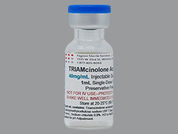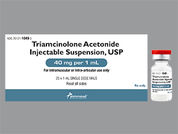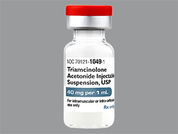Triamcinolone Acetonide
Triamcinolone Acet/0.9%Nacl/Pf
What is Triamcinolone Acetonide used for?
This medication is used in a variety of conditions such as allergic disorders, arthritis, gout, blood diseases, breathing problems, certain cancers, eye diseases, intestinal disorders, collagen and skin diseases. Talk to your doctor about the risks and benefits of triamcinolone, especially if it is to be injected near your spine (epidural). Rare but serious side effects may occur with epidural use. Triamcinolone is known as a corticosteroid hormone (glucocorticoid). It works by decreasing your body's immune response to these diseases and reduces symptoms such as swelling.
CHEMICAL NAME
DRUG TYPE
Triamcinolone Acetonide Prices
Searching for the lowest prices
What does Triamcinolone Acetonide look like?
View all Triamcinolone Acetonide Image Information (28)Triamcinolone Acetonide Frequently Asked Questions
Before using triamcinolone, tell your doctor or pharmacist if you are allergic to it; or to other corticosteroids (such as methylprednisolone); or if you have any other allergies. This product may contain inactive ingredients, which can cause allergic reactions or other problems. Talk to your pharmacist for more details.
Before using this medication, tell your doctor or pharmacist your medical history, especially of: bleeding problems, blood clots, bone loss (osteoporosis), diabetes, certain eye diseases (such as cataracts, glaucoma, herpes infection of the eye), heart problems (such as heart failure, recent heart attack), high blood pressure, current/past infections (such as joint infections and infections caused by fungus, herpes, tuberculosis, threadworm), kidney disease, liver disease (such as hepatitis B), mental/mood conditions (such as psychosis, anxiety, depression), stomach/intestinal problems (such as diverticulitis, ulcer, ulcerative colitis), seizures, thyroid problems, mineral imbalance, a certain adrenal gland tumor (pheochromocytoma).
This drug may make you dizzy. Alcohol or marijuana (cannabis) can make you more dizzy. Do not drive, use machinery, or do anything that needs alertness until you can do it safely. Limit alcoholic beverages. Talk to your doctor if you are using marijuana (cannabis).
Using corticosteroid medications for a long time can make it more difficult for your body to respond to physical stress. Before having surgery or emergency treatment, or if you get a serious illness/injury, tell your doctor or dentist that you are using this medication or have used this medication within the past 12 months. Tell your doctor right away if you develop unusual/extreme tiredness or weight loss. If you will be using this medication for a long time, carry a warning card or medical ID bracelet that identifies your use of this medication.
This medication may mask signs of infection. It can make you more likely to get infections or may make current infections worse. Stay away from anyone who has an infection that may easily spread (such as chickenpox, COVID-19, measles, flu). Talk to your doctor if you have been exposed to an infection or for more details.
Tell your health care professional that you are using triamcinolone before having any immunizations, vaccinations, or skin tests. Avoid contact with people who have recently received live vaccines (such as flu vaccine inhaled through the nose).
This medicine may cause stomach bleeding. Daily use of alcohol while using this medicine may increase your risk for stomach bleeding. Limit alcoholic beverages.
Older adults may be more sensitive to the side effects of this drug, especially bone loss/pain, stomach/intestinal bleeding, and mental/mood changes (such as confusion).
This medication may slow down a child's growth if used for a long time. Consult the doctor or pharmacist for more details. See the doctor regularly so your child's height and growth can be checked.
Injecting this medication into a muscle is not recommended for children younger than six years. Consult your doctor for more details.
During pregnancy, this medication should be used only when clearly needed. It may rarely harm an unborn baby. Discuss the risks and benefits with your doctor. Infants born to mothers who use corticosteroid medications for a long time may have hormone problems. Tell your doctor right away if you notice symptoms such as nausea/vomiting that doesn't stop, severe diarrhea, or weakness in your newborn.
It is unknown if this medication passes into breast milk. Consult your doctor before breastfeeding.
IMPORTANT: HOW TO USE THIS INFORMATION: This is a summary and does NOT have all possible information about this product. This information does not assure that this product is safe, effective, or appropriate for you. This information is not individual medical advice and does not substitute for the advice of your health care professional. Always ask your health care professional for complete information about this product and your specific health needs.



